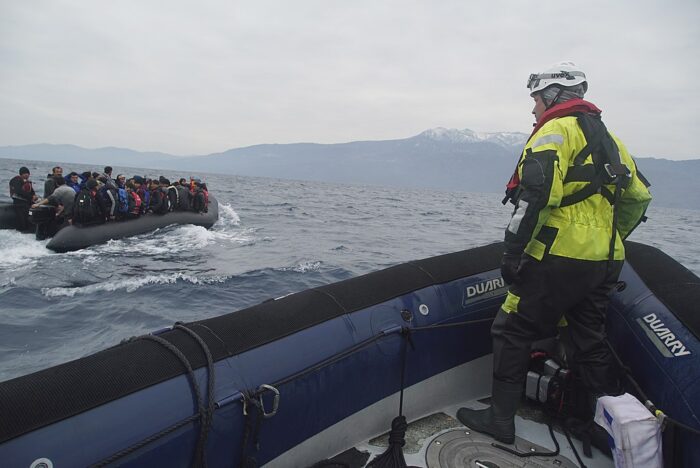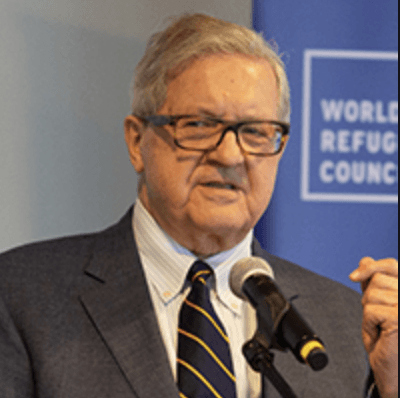Lloyd Axworthy & Allan Rock
Sarah and Yusra Mardini are Syrian refugees whose compelling stories are depicted in the 2022 Netflix film The Swimmers. Competitive swimmers as they grew up in Damascus, the two sisters fled Syria’s civil war in 2015. During a perilous crossing to Lesbos, Greece, their dinghy began sinking in the Aegean Sea. They lept into the water and swam alongside the boat for hours, keeping the craft afloat and saving the lives of all who were onboard. The sisters eventually settled in Germany, where they resumed their training, and Yusra fulfilled a dream by swimming at the 2016 Rio Summer Olympics on the first-ever IOC Refugee Team.
Sarah returned to Lesbos to work with a migrant search-and-rescue operation. The reward for her selfless efforts? She was arrested in 2018 along with 23 other humanitarian workers, and charged with alleged crimes arising from the assistance they had given to migrants. They were held in pre-trial detention for over 100 days. Although a Greek court last week dismissed many of the charges on a technicality, Sarah and the others still face potential prison sentences on other charges. The episode has had a chilling effect on humanitarian work in Greece, where many NGOs have now curtailed operations.
By criminalizing humanitarian work, Greece has added a sinister new dimension to the increasingly hostile environment facing migrants and asylum seekers throughout Europe.
In Italy, the ultra-right-wing regime of Prime Minister Giorgia Meloni is fining humanitarian organizations that assist refugees and has started impounding their ships. Spain has resisted, with fatal consequences, the entry of migrants into its North African enclaves. Hungary remains a gated jurisdiction that engages in what critics have called “migratory apartheid,” and has tried to criminalize the offering of assistance to asylum seekers. France has refused to accept scores of asylum seekers rescued from the Mediterranean Sea. And the United Kingdom has resumed flights to Rwanda filled with migrants who had sought asylum in the country, but are now being turned away.
In the Western Hemisphere, desperate families fleeing violence in Central and South America are still crowding the southern United States border, as the Biden administration tests out various solutions that have the same consequence: denying the right migrants have under international law to claim asylum.
Even among countries friendlier to migrants, there is a shocking indifference to the plight of the displaced and a failure to rally support for their rights.
El record number of forcibly displaced people in the world today (around 100 million) is a sign of things to come. Endemic poverty, violent conflict and the accelerating effects of climate change will soon combine even further to produce levels of displacement that will dwarf the present numbers (current estimates predict there will be about 1 billion displaced people worldwide by 2050). The World Refugee and Migration Council has advocated for more effective and humane ways of managing displacement globally. But in the meantime, too many countries react to refugees as though they were a foreign invasive species.
Canadians must not be smug or complacent about our own response to forced migration. We deserve credit for our unique community sponsorship of refugees, and we take pride in our reputation as a country that respects human rights. But we tend to overlook serious issues resulting from our own policies. As documented by Human Rights Watch, thousands of migrants and asylum seekers have been detained by the Canada Border Services Agency (CBSA) in recent years, often in abusive conditions and sometimes in provincial jails. Many are held in immigration detention for extended periods – without having committed any crime – while awaiting the determination of their legal status. The many deaths that have occurred in detention, like that of Abdurahman Hassan, whose coroner’s inquest is ongoing in Ontario, illustrate the desperation and suffering migrants and asylum seekers often endure. Just last month, on Christmas Day, another person died in immigration detention in Surrey, B.C.
Furthermore, our Safe Third Country Agreement with the United States bars entry to those migrants who arrive at our borders from the U.S., forcibly returning migrants to a country that in recent years has abrogated its international responsibility to receive those who claim asylum.
We call upon the Prime Minister to end the detention of migrants and asylum seekers in provincial jails, and to review critically the detention policies of the CBSA. Once our own house is in order, Canada should mobilize an international coalition to reaffirm the ancient right to seek asylum and to call out those who would unlawfully deny it or criminalize assistance to refugees. Leadership can make a difference. Canada can provide it. The time to do so is now.
Photo: Mstyslav Chernov/Unframe (Wikimedia Commons)
This article was first published by The Globe & Mail


